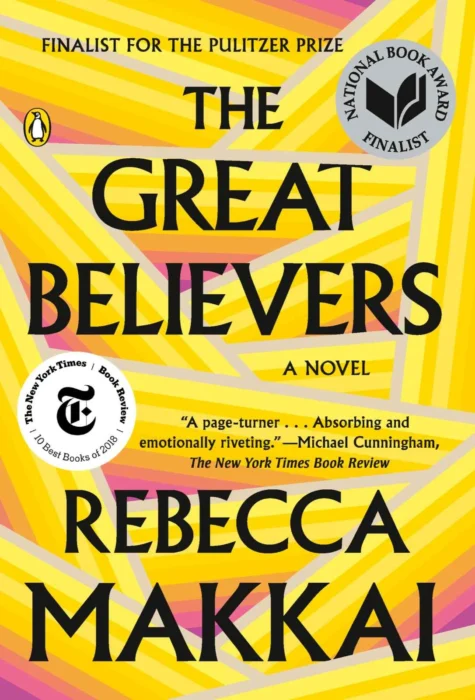For English review, please scroll down.
The Great Believers הוא רומן חשוב, כן. אבל, עם כל הכבוד ליומרה, הוא לא הצליח לגרום לי… להאמין.
זהו רומן שאפתני שנוגע בתמות כבדות כמו מגפת האיידס בשיקגו של שנות ה־80, אתיקה של יחסי מין בעידן של מגפה קטלנית, אובדן קולקטיבי, וחוויית האשמה של מי שנותרו מאחור. על אף העושר הנרטיבי, ואולי דווקא בגללו, לא הצלחתי להתחבר לאף אחת מהדמויות, ולעתים אף חשתי שהעלילה עצמה חומקת ממני, כאילו ביקשה לשמור ממני מרחק.
קראתי את הספר לאחר שנהניתי מ־I Have Some Questions for You, שהיה מדויק, מורכב ומעורר מחשבה. אולי לכן האכזבה כאן הייתה כל כך חדה.
הסיפור עוקב אחר חמישה חברים גאים, על רקע התפרצות האיידס בשנות ה־80. העלילה נעה בין שני קווי זמן: בשיקגו של 1985, ייל , עובד בגלריה , מנסה לשרוד רגשית בעוד חבריו נופלים בזה אחר זה למגפה; ובפריז של 2015, פיונה , אחותו של ניקו, חברו הקרוב של ייל – מחפשת אחר בתה, שנעלמה אחרי שהצטרפה לכת.
הבחירה לתזמר את הסיפור בשני צירים מקבילים מנסה לייצר הקבלה בין טראומות דוריות שונות ,מגפה מול אובדן דרך אמונה קיצונית, שכול מול חיפוש. גם השוואה מרומזת נעשית בין "הדור האבוד" של מלחמת העולם הראשונה לדור הלהט"בי שנפגע קשות באיידס , השוואה שנועדה לעגן את הרומן בתוך מסורת של שבר קיומי וכתיבה על קהילות שחרב עבר בהן. אך דווקא היומרה הזו, שמבקשת לחבר בין נקודות היסטוריות ורגשיות כל כך כבדות, יוצרת תחושת פיזור, כאילו כל טראומה מנסה לגבור על זו שלפניה, והרגש מתקהה.
העלילה כוללת ריבוי דמויות , חלקן כתובות בעדינות, אך רבות מהן אינן נושאות משקל של ממש, והן רק מסיטות את תשומת הלב ממה שיכול היה להיות גרעין רגשי חזק. התחושה היא שהרומן מנסה לאחוז בכל כאב , ולבסוף מותיר את הקורא אטום, מוצף מידי בפרטים ודמויות בשביל להרגיש.
הבעיה המרכזית, בעיניי, היא תנועת העלילה. הזיגזוג בין שני הקווים מתרחש שוב ושוב, ללא קצב ברור, מבלי לאפשר חיבור רגשי עקבי או בניית מתח אמיתי. השאלות העמוקות שהספר שואל, איך זוכרים? איך ממשיכים? , נבלעות בתוך המבנה ולא מגולמות באמת דרך הדמויות.
החלק העוסק במגפת האיידס כתוב באמפתיה ובידע, ויש בו ניסיון אמיתי להעיר את זכרם של המתים והחיים גם יחד, דור שנמחק ושגם כיום לא זוכה למקום בזיכרון הקולקטיבי. ההקשרים ההיסטוריים, המשפטיים והחברתיים נוכחים, אך משתלבים בסיפור שמעמיס עליהם עלילות משנה כמו כת בפריז, יחסים לא פתורים בין אם לבת, וביקורת חיוורת על עולם האמנות. הכול יחד, יותר מדי.
The Great Believers מנסה להיות רומן "גדול": כזה שיאחז באמת רגשית, בזיכרון קולקטיבי ובחיים שנמחקו. אבל דווקא המאמץ הזה, להיות יצירה קאנונית של דור, פוגם בכוחו. כשהכול חשוב, שום דבר לא חשוב באמת. הכובד הזה לא שוקע, הוא פשוט צף על פני המים. הספר הזה לא גרם לי לחשוב מחדש, לא כאב לי ולא זעזע אותי , הוא פשוט נמשך הלאה. כתוב טוב, אבל מרוחק. לעומת הרומן הקודם של מקקיי, שהצליח לצלול עמוק בלי לאבד את הקורא, כאן הרגשתי שאני עומדת על החוף , צופה בגלים מתקרבים, אך לא נרטבת מהם.
The Great Believers/ Rebecca Makkai
Kindle Edition, 2018, 431 Pp
דירוג SIVI –
איכות אודיו –

The Great Believers is an ambitious novel that delves into weighty themes: the AIDS epidemic in 1980s Chicago, sexual ethics during a deadly health crisis, collective loss, and the survivor’s guilt of those left behind. Despite, or perhaps because of, its narrative richness, I struggled to connect with any of the characters, and at times felt the story slipping away from me, as if it wished to keep its distance.
After thoroughly enjoying I Have Some Questions for You, I read this book, which was sharp, intricate, and thought-provoking. Perhaps that’s why the disappointment here hit so hard.
The novel follows five gay friends amid the AIDS crisis of the '80s. It moves between two timelines: in 1985 Chicago, Yale, a gallery worker, tries to hold on emotionally as his friends fall one by one to the epidemic; in 2015 Paris, Fiona, sister of Nico, Yale’s close friend, searches for her daughter, who has disappeared into a cult.
The dual timeline structure attempts to draw parallels between generational traumas, plague versus loss through extreme faith, and grief versus search. There's also an implicit comparison between the “lost generation” of World War I and the LGBTQ+ generation devastated by AIDS, a gesture meant to anchor the novel in a literary tradition of existential rupture and narratives of erased communities. Yet this very ambition, the desire to connect emotionally and historically charged nodes, results in narrative diffusion. Every trauma seems to compete with the previous one, and the emotional resonance dulls.
The story is peopled with an abundance of characters, some drawn delicately, but many of them peripheral and ultimately weightless. Instead of deepening the emotional core, they dilute it. The novel seems to want to hold every possible pain, but ends up leaving the reader numb, overwhelmed with details, and too many lives to honestly care.
The central problem is the movement of the plot. The constant zigzag between timelines occurs without a precise rhythm, preventing emotional investment and the buildup of genuine tension. The more profound questions the book poses — how do we remember? How do we go on? , get swallowed by the structure, rather than being embodied by its characters.
The portions that deal directly with the AIDS epidemic are written with empathy and insight, offering a genuine attempt to resurrect the memory of both the dead and the living, a lost generation still largely absent from collective memory. The historical, legal, and social contexts are present. Still, they’re overlaid with too many subplots: a cult in Paris, unresolved mother-daughter dynamics, and a faint critique of the art world. All of it, together, simply too much.
The Great Believers wants to be a “great” novel: one that captures emotional truth, collective memory, and the lives erased by history. However, that very effort—the attempt to become a canonical work of a generation—undermines its power. When everything is necessary, nothing feels truly important. The weight here doesn’t sink — it floats.
This book didn’t make me rethink; it didn’t wound or move me; it just carried on. Well-written, but remote. Unlike Makkai’s previous novel, which managed to go deep without losing the reader, here I felt like I was standing on shore, watching the waves roll in, but never getting wet.
לגלות עוד מהאתר Sivi's Books
Subscribe to get the latest posts sent to your email.

